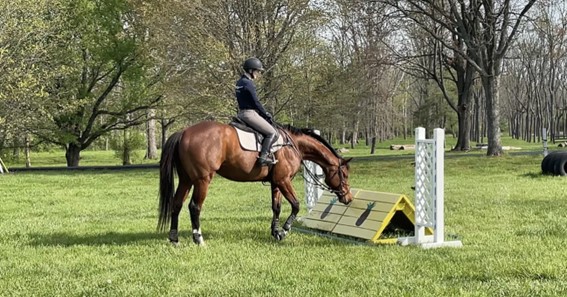Are you curious to know what is an OTTB horse? You have come to the right place as I am going to tell you everything about an OTTB horse in a very simple explanation. Without further discussion let’s begin to know what is an OTTB horse?
In the equestrian world, Off-The-Track Thoroughbred (OTTB) horses have gained significant recognition and admiration. These magnificent creatures, once prized for their racing abilities, transition into second careers as versatile and talented sport horses. In this blog, we will explore the world of OTTB horses, their unique qualities, the transition process from the track to new endeavors, and the joy they bring to equestrians.
What Is An OTTB Horse?
An OTTB horse refers to a Thoroughbred racehorse that has retired from the racing industry and is now seeking a new purpose and career. These horses are typically retired at a relatively young age, usually between three to six years old. While their racing careers may have come to an end, their athleticism, intelligence, and spirit make them exceptional candidates for various equestrian disciplines.
The Transition Process:
Transitioning an OTTB horse from the track to a new career involves patience, training, and understanding. Here are a few key aspects of this process:
- Letting Them Decompress: After retiring from the racetrack, OTTB horses often benefit from a period of downtime. This allows them to relax, recover, and adjust to a new routine. It is during this time that they begin to transform from racehorses to well-rounded sport horses.
- Retraining and Skill Development: OTTB horses require retraining to adapt to their new roles. This involves introducing them to basic horsemanship skills, such as walk, trot, canter, and proper riding aids. They gradually learn new disciplines, such as dressage, jumping, eventing, or trail riding, depending on their aptitude and the rider’s goals.
- Building Trust and Confidence: Building a bond of trust between rider and horse is crucial. OTTB horses often benefit from patient and compassionate handling, allowing them to gain confidence in their new environment and develop a strong partnership with their rider.
- Physical Conditioning: OTTB horses may require conditioning and strengthening exercises to build the appropriate muscles for their new discipline. Gradual conditioning programs and proper nutrition ensure their physical well-being and optimize their performance.
The Benefits Of OTTB Horses:
- Athleticism and Versatility: Thoroughbreds are renowned for their speed, agility, and athleticism. These qualities make them well-suited for various equestrian disciplines, including dressage, show jumping, eventing, and even pleasure riding.
- Intelligence and Willingness to Learn: OTTB horses are intelligent and quick learners. They possess a strong work ethic, making them eager to please their riders and excel in their new careers.
- Heart and Determination: Having spent their early years on the racetrack, OTTB horses have developed a competitive spirit and a strong desire to perform. This determination, combined with their natural athleticism, can lead to remarkable achievements in their new endeavors.
- Connection and Partnership: OTTB horses often form deep bonds with their riders. Their loyalty and willingness to bond with their human counterparts create a special connection that enhances the joy of riding and competing together.
Conclusion:
OTTB horses are remarkable creatures that transition from the fast-paced world of racing to a second career filled with possibilities. With their athleticism, intelligence, and willingness to learn, these horses captivate the hearts of equestrians in various disciplines. The transition process may require time, patience, and skill, but the rewards are immeasurable. Whether galloping over jumps, executing a graceful dressage test, or embarking on leisurely trail rides, OTTB horses bring joy, excitement, and an undeniable spirit to their new endeavors. So, consider the remarkable journey of an OTTB horse and open your heart and stable to the incredible potential they hold.
Visit Longests to know about longest things in the world.
FAQ
Is An OTTB A Good First Horse?
While there are exceptions to every rule, an OTTB is usually not well suited to a beginner or even intermediate rider. This horse needs to not only be re-trained to develop into a safe riding horse but will also need to be un-trained in what he has come to learn is expected from him under saddle.
How Much Does OTTB Cost?
How Much Does An OTTB Horse Cost? An OTTB horse will cost on average between $1,000 to $3,000. The price of an off-the-track Thoroughbred will vary based on its race pedigree, temperament, height, and bloodline.
Why Not To Buy An OTTB?
There Are Risks When Buying An OTTB Horse
OTTB horses often come with horrific damage caused by racing, and most of their physical features can be influenced, like back, joints, knees, neck, etc. The damage caused by racing can be so severe that most horses never recover fully.
How Often Do You Have To Ride The OTTB?
First of all, let’s deal with your over-all question; how many days a week do I recommend that you ride your OTTB? At the beginning, I want you to ride seven days a week. Don’t ride for long, 30-45 minute is plenty.
I Have Covered All The Following Queries And Topics In The Above Article
What Is The Average Height Of An OTTB Horse
What Kind Of Horse Is An OTTB
What Kind Of Horse Is An OTTB?
10 Reasons Not To Buy An OTTB
OTTB Horse For Sale
OTTB Adoption
OTTB Rescue
OTTB Lookup
OTTB Urban Dictionary
What Is A Lame Horse
What Is Rain Rot In Horses
What Is An OTTB Horse
Why are Thoroughbreds so cheap
What is an ottb horse?
